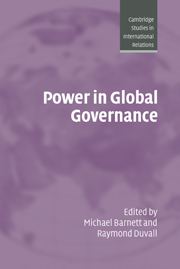Book contents
- Frontmatter
- Contents
- Notes on the contributors
- Acknowledgements
- 1 Power in global governance
- 2 Power, institutions, and the production of inequality
- 3 Policing and global governance
- 4 Power, fairness, and the global economy
- 5 Power politics and the institutionalization of international relations
- 6 Power, governance, and the WTO: a comparative institutional approach
- 7 The power of liberal international organizations
- 8 The power of interpretive communities
- 9 Class powers and the politics of global governance
- 10 Global civil society and global governmentality: or, the search for politics and the state amidst the capillaries of social power
- 11 Securing the civilian: sex and gender in the laws of war
- 12 Colonial and postcolonial global governance
- 13 Knowledge in power: the epistemic construction of global governance
- References
- Index
- CAMBRIDGE STUDIES IN INTERNATIONAL RELATIONS: 98
13 - Knowledge in power: the epistemic construction of global governance
Published online by Cambridge University Press: 22 September 2009
- Frontmatter
- Contents
- Notes on the contributors
- Acknowledgements
- 1 Power in global governance
- 2 Power, institutions, and the production of inequality
- 3 Policing and global governance
- 4 Power, fairness, and the global economy
- 5 Power politics and the institutionalization of international relations
- 6 Power, governance, and the WTO: a comparative institutional approach
- 7 The power of liberal international organizations
- 8 The power of interpretive communities
- 9 Class powers and the politics of global governance
- 10 Global civil society and global governmentality: or, the search for politics and the state amidst the capillaries of social power
- 11 Securing the civilian: sex and gender in the laws of war
- 12 Colonial and postcolonial global governance
- 13 Knowledge in power: the epistemic construction of global governance
- References
- Index
- CAMBRIDGE STUDIES IN INTERNATIONAL RELATIONS: 98
Summary
This chapter aims to anchor a normative theory of global governance in a reworked conception of epistemes that accounts for the role of productive power and institutional power in setting the conditions of possibility for good (moral) global governance. We outline our argument in three parts. First, we reintroduce a modified conception of episteme into the international relations (IR) literature to argue that power is a disposition (in the sense of ordering or controlling) that depends on knowledge. Power is also productive in the sense of defining the order of global things, to paraphrase Michel Foucault. In addition, we try to show that power's productive capacity is often followed by the development of formal and informal institutions that play a role in fixing meanings, which are necessary for global governance. Second, we put forward a normative theory of the requirements of global governance that builds on these notions. We argue that global governance rests on material capabilities and knowledge, without which there is no governance, and legitimacy and fairness, without which there is no moral governance. Third, we bring these insights to bear on a brief discussion of the effects of epistemes on emerging pockets of global governance and the possibilities and limits of moving global governance in a more sustainable and just direction. We use international trade and the related legal system to illustrate the above relationship.
- Type
- Chapter
- Information
- Power in Global Governance , pp. 294 - 318Publisher: Cambridge University PressPrint publication year: 2004
- 18
- Cited by



